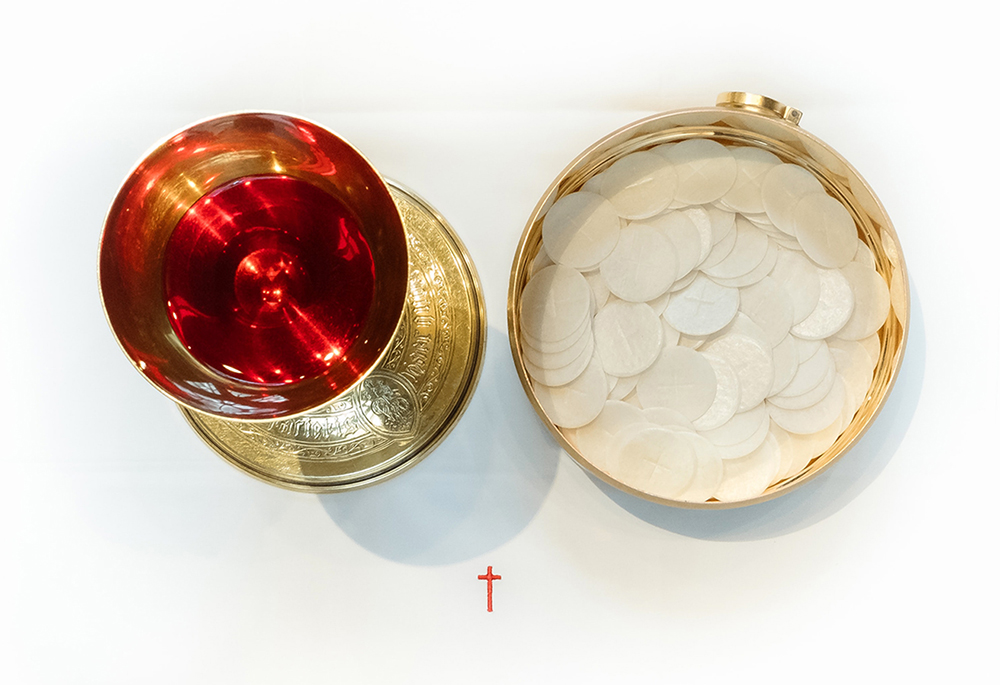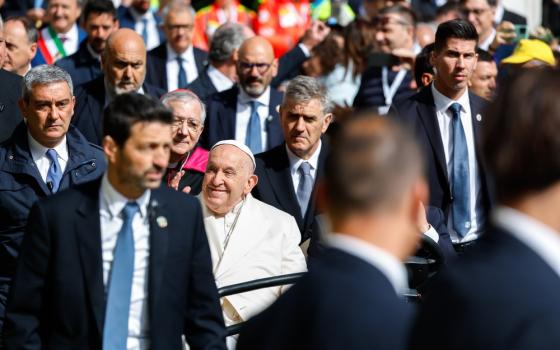
(Unsplash/Josh Applegate)
Streaming the Eucharist online for the world to watch or broadcasting it on television is an abomination, akin to showing video of people eating a meal to starving people.
A video experience of the Eucharist might have value if it makes people hunger for the real thing, but as an alternative for showing up to church, it is the ecclesial equivalent of substituting a cooking channel for a dinner with family or friends.
It is time for the church to tell priests to stop broadcasting the Eucharist.
Prior to the pandemic, watching the Mass on television was a rarity, limited to EWTN customers and the occasional major papal ceremony. Regular broadcasts were principally aimed at shut-ins and the sick. I support continuing limited broadcasting to such parishioners as long as they are brought Communion from the parish Mass they had watched online.
During the pandemic, it was difficult, if not impossible, to celebrate the Eucharist in parishes because of the fear of contagion. In many places public health officials told people, especially the elderly, to stay home rather than risk the possibility of infection. One pastoral response to the pandemic was to make the Eucharist available for watching online.
But we have become so accustomed to online Eucharists that they are viewed as normal and appropriate. Many parishes continue to stream the Eucharist live even though the pandemic has passed. With the streaming equipment already installed, the cost is minimal. Pastors, meanwhile, don't want to give up the online donations.
And the momentum is likely to continue. If not banned, remotely observed Eucharists may become even more common as the church's way of dealing with a shortage of priests.
Advertisement
Taking online Eucharists to their logical conclusion, people could try to receive Communion from the comfort of home. Bread and wine could be put in front of the screen, and the priest could consecrate them from afar. If God is powerful enough to change the bread and wine when it is on the altar a short distance from the priest, isn't God powerful enough to do it at a distance of thousands of miles? Miracles don't require proximity.
But a fully remote Eucharist would be counter to the church's communal view of the Eucharist. It would see the Eucharist not as a communal meal but as individualistic nourishment. An online Eucharist puts us in our own bubble and separates us from community and place. It turns the church from a community of the disciples of Christ into an online delivery service, like Domino's Pizza.
The church has a history of doing stupid things with the Eucharist. For centuries, the Eucharist was celebrated in a language the people did not understand. For centuries, people were told to adore the consecrated bread but not to eat it.
Streaming the Eucharist online continues a pattern of not understanding the true meaning of the Eucharist.
While watching the Eucharist online is nonsensical, however, broadcasting the Liturgy of the Word makes eminent sense. The Word can be shared in many forms: spoken, written, in churches, in homes, televised and online. A meal can only be shared in person.
Curtailing the broadcasting of the Eucharist may cause pastoral pain for some, pain equivalent to putting the Mass into the vernacular. The change should be preceded by appropriate catechesis that would prepare people for the change.
The change will not deny the Eucharist to people; they don't have the Eucharist now. They only have an illusion of the Eucharist.







